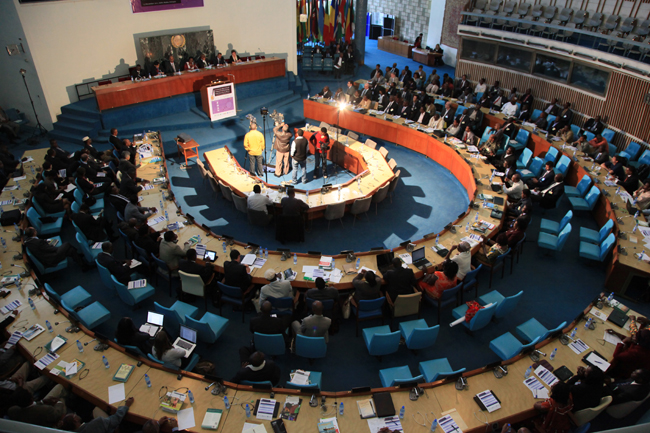 The ReSAKSS team recently participated--along with policymakers, researchers, academics, and representatives from private companies and farmer and trader organizations--in an international conference, “Agricultural Productivity & Food Security in Africa,” facilitated by IFPRI in conjunction with the African Union Commission (AUC) and the United Nations Economic Commission for Africa (UNECA). The conference, which aimed to create a broad new policy framework for improving agricultural productivity in Africa, served as a reminder that agricultural yields do not necessarily indicate increased food and nutrition. Employing technology, developing rural areas for better access, arranging markets and value chains for agricultural products, ensuring high nutritional outputs, and incorporating an awareness of climate change, support for capacity building and training, must also be incorporated.
The ReSAKSS team recently participated--along with policymakers, researchers, academics, and representatives from private companies and farmer and trader organizations--in an international conference, “Agricultural Productivity & Food Security in Africa,” facilitated by IFPRI in conjunction with the African Union Commission (AUC) and the United Nations Economic Commission for Africa (UNECA). The conference, which aimed to create a broad new policy framework for improving agricultural productivity in Africa, served as a reminder that agricultural yields do not necessarily indicate increased food and nutrition. Employing technology, developing rural areas for better access, arranging markets and value chains for agricultural products, ensuring high nutritional outputs, and incorporating an awareness of climate change, support for capacity building and training, must also be incorporated.
This conference served as a reminder that agricultural yields do not necessarily indicate increased food and nutrition resilience. The nature of fine tuning the definitions and parameters of how to perform productivity initiatives successfully was widely discussed and debated. Holistic dimensions of improving agricultural productivity are not merely by producing more yield, it also involves employing technology, developing rural areas for better access, arranging markets and value chains for agricultural products, ensuring high nutritional outputs, awareness of climate change, capacity building and training support, and other such necessary items of concern to plan into the methods of improvement overall.
IFPRI Director General Shenggen Fan remarked, “increasing agricultural productivity is not a panacea to all problems, but it can make a significant positive contribution to resolve issues of food insecurity in Africa.” Abebe Haile Gabriel, Director of the AUC’s Rural Economy and Agriculture Division, continued by stating that broad solutions are necessary. “Improving rural infrastructure to facilitate trade of goods–both at the country level, and across borders–would serve as an opportunity to improve food security in Africa,” Gabriel said.
ReSAKSS Addresses Productivity and Sustainability
ReSAKSS shared with the audience an overview of its purpose and background and a snapshot of the agricultural productivity situation in Sub-Saharan Africa, and presented a framework of tools and analysis designed to help sequentially monitor and evaluate the productivity and sustainability of programs over time.
- The opportunities and challenges of a regional spacial characterization of agricultural productivity, (via Geographic Information System mapping),
- Key typologies for focusing country efforts through the geographic location to find opportunities through farming systems,
- Representative farm analysis of productivity to give specific details of productivity results, and
- Case study analyses from Eastern Africa of factors affecting the scale and sustainability of productivity growth.

Presenters: Zhe Guo, Bingxin Yu, Alejandro Nin Pratt, Stella Massawe. Chair: Samuel Benin.
As the conference concluded, Mafa Chipeta, FAO Coordinator for Eastern Africa, reinvigorated the audience to reach the numerous goals of food security each country faces, telling the audience, “We are comfortably numb with our discomfort.” We need to treat it as a war situation.” He said. “We need to solve this problem using every necessary measure.”
Josué Dioné, Director of UNECA’s Food Security and Sustainable Development Division, offered another call to action, saying “increasing agricultural productivity in Africa calls for broader policy and strategic frameworks that encompass the whole agriculture value chain, including agribusiness and agro-industrial sectors as well as farming.”
ReSAKSS members and participants left the conference reawakened to taking the next steps with new information, tools, and networks to work with.
Visit the Official Conference Website for more information.
View thoughts, continued coverage and news on the conference via Twitter. Conference news can be found with tag #Addis2011.

